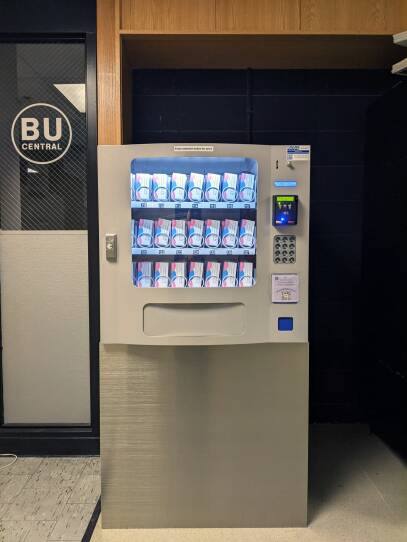As a new semester starts, not all college students across Massachusetts have the same access to reproductive health care on their campus. Some undergraduates at private and public colleges are working to get more options for themselves and their peers, with and without support from their schools.
Urged by student activists, UMass Amherst this semester began offering medication abortion to students at its campus health center. Northeastern University will install a vending machine on campus with emergency contraception, much like the one Boston University installed earlier this year, which offers what’s often called the morning-after pill. Some universities, like Boston College, don’t provide contraception on campus, but an underground group of students there has been organizing to provide free sexual health products.
The students at these universities are part of a network of official and unofficial student groups that are pushing for change and filling in the gaps where they see their schools’ resources falling short on a wide range of reproductive health access. They say they’ve been energized by the Supreme Court’s Dobbs v. Jackson Women’s Health Organization decision, which overturned Roe v. Wade and created a patchwork of abortion laws across the United States.
Under the radar activism
For a little more than a decade, Students For Sexual Health has worked to provide Boston College students with condoms and other sexual health products. The student-run group operates independently and has no official recognition or support from the university.
Providing contraception to students goes against university policy, although the school will give students birth control for medical, non-contraceptive reasons. “As a Catholic University, Boston College’s University Health Services Department does not distribute condoms or refer students for an abortion. Their policy is consistent with Catholic universities nationwide, and is part of our obligation as Catholic institutions to uphold Church teaching,” Jack Dunn, a spokesman for Boston College, said in an email.
Students for Sexual Health works in direct conflict with the university’s student code of conduct, and there have been several times in the past when the group has had to stop operating due to conflicts with the administration. They work around the policy by distributing condoms on sidewalks around campus that are officially not college property, and through a subscription service in which students can request condoms, dental dams, lube and other products to be delivered to them for free through campus mail in unmarked envelopes.
“It all has to be extremely discreet and very word of mouth,” said Tabitha, a Boston College student who is part of the group and requested to use her first name only.
The group gets some funding from Planned Parenthood. But because it is in direct violation of school rules, they must organize discreetly through personal emails and off-campus meetings.
While medication abortion and emergency contraception vending machines would be a distant dream for students at Boston College, Tabitha says the group is often in a “precarious situation” to provide students resources without operating in a way that would get them shut down.
“We would much rather exist and do what we can for students than kind of go in a more advocating direction that might get us booted,” she said.
Following the Dobbs decision, one of the group’s goals this year is to start providing the emergency contraception Plan B.
Tabitha says the group is not necessarily advocating for a change to the college’s policy and understands that the school’s stance isn’t likely to change, yet they are disappointed that sexual health resources aren’t treated the same as other types of support.
“That's another thing that you would expect Boston College to do is ... make sure that their students are the most safe, happy and healthy that they can be. And sexual health is an extremely important part of that,” she said.
Removing barriers
While the BC students operate under the radar, some student groups have been able to work collaboratively with their school to get more reproductive health support — after some advocacy.
Molly Baker, who was co-president of the Boston University group Students for Reproductive Freedom and graduated in May, says that the vending machine on campus is filling an important need for students. Emergency contraception generally has to be taken within three days of unprotected sex, which means it can be difficult for students to access when it’s most needed.

The machine was installed in the basement of the student union building last March after a five-year campaign. Students responded enthusiastically. Within a few months, Baker says they had sold about 1,000 orders of the pills, a generic version of Plan B.
The student group fronted the cost of the first order for the medication, which they buy through campus health services, and set a price that covers the cost of machine upkeep by the university’s vending operations.
“So we’re selling it at no profit — it’s $7.25 and basically it just funds itself,” Baker said. Name-brand Plan B usually costs around $50.
They still get inquiries from students across the country on how they can get a machine on their own campus.
“Sometimes it’s a little bit tricky for us [to guide other students] because we are part of a community that was super accepting of this project,” she said. “We never really had any pushback from the administration. Nobody told us no. Some people told us that they didn't know how, but nobody told us that we couldn't do it.”
Inspired by Boston University and other universities in the Boston area with emergency contraception vending machines, the student activist group NU SHARE (Northeastern University Sexual Health Advocacy, Resources and Education) began their campaign to do the same. Ren Birnholz, a fourth-year student who is president of NU SHARE, said the vending machine will break down barriers like cost, transportation and stigma.
“A lot of college students are navigating the health care system by themselves for the first time,” they said. “The last thing we want to do is have any barriers in the way of someone feeling like they don't have autonomy in that moment.”
The machine will likely be installed this fall in Marino Atrium, a centrally located building that will be open to all community members 18 hours a day.
The vending machine is just the beginning for the students. The group wants to expand the types of products available on campus and host outreach events.
“This is going to be a long-term battle,” Birnholz said. “We felt like, as college students in our situation, one thing we can do is advocate within the confines of our university.”

Rebecca Hart Holder, executive director of Reproductive Equity Now, calls student efforts to expand access to reproductive health care “hyperlocal activism” that can set an example for others.
“The student groups are in such an interesting and kind of cutting-edge position because they understand what’s going on at their schools better than anyone else,” Hart Holder said. “So for students at BC, they know that the administration, because it’s a Catholic university, is not going to change its mind on contraception. But if they’re finding a different way to connect folks to resources, I think that’s incredible.”
Thanks to advocates, some schools are ahead of the curve
At the end of June, Gov. Charlie Baker signed a bill into law that will require public universities in the state to provide medication abortion — the two-prescription regimen that can be taken up to 10 weeks of pregnancy — to students, either at campus health centers or through outside resources. They will need to submit plans by November 2023 to set up the programs.
UMass Amherst, the state’s flagship university, was already planning to offer medication abortion to students this fall. The policy change at UMass came after student and lawmaker advocacy.
Students organized events and an online forum to speak out about the barriers faced while seeking abortions. Along with State Rep. Lindsay Sabadosa, who sponsored the bill, they organized a “Repro Ride” last October to demonstrate the hours-long trek on public transportation required to get to the closest clinic in Springfield.
"I think the student groups are in such an interesting and kind of cutting edge position because they understand what's going on at their schools better than anyone else."-Rebecca Hart Holder, Reproductive Equity Now
Shannon Craig, who was an intern with Sabadosa while she was a UMass student, says she hopes the type of advocacy undertaken by UMass students could be a model for other universities or institutions.
“I think overall the environment is a perfect place to start this process because it is such a big school and it does have a big influence on the other UMasses as well. And then, that is a good prototype for other states to follow suit,” she said.
Some students, like sophomore Dylan Nguyen, want the university to go further. He wrote an op-ed in July in the student newspaper is advocating for the university to offer medication abortion through the mail to reach students and faculty while they are off campus. He knows mailing abortion pills across sate lines is a legal gray area. But he says defying state policy is familiar territory for the school that provided unwedded students with birth control before it became legal in 1972. “[UMass] has had ... a history of actually breaking state law and defying state law to offer students health and health access to abortions,” he said.
Reproductive rights advocates hope that, like UMass, schools will continue to expand their sexual health support for students. Massachusetts’ new law doesn’t apply to private universities and colleges, but those institutions may follow suit when they see the relatively low overhead required to provide medication abortion.
Hart Holder said she’s heard rumblings about private colleges looking into medication abortion. She called the new policy a “game changer.”
“You don’t have to travel off campus for care,” she said. “And, you know, that means you don’t have to miss school or your internship. If you don’t have a car, you don’t have to go through the rigamarole of trying to navigate public transit. So that’s huge.”








